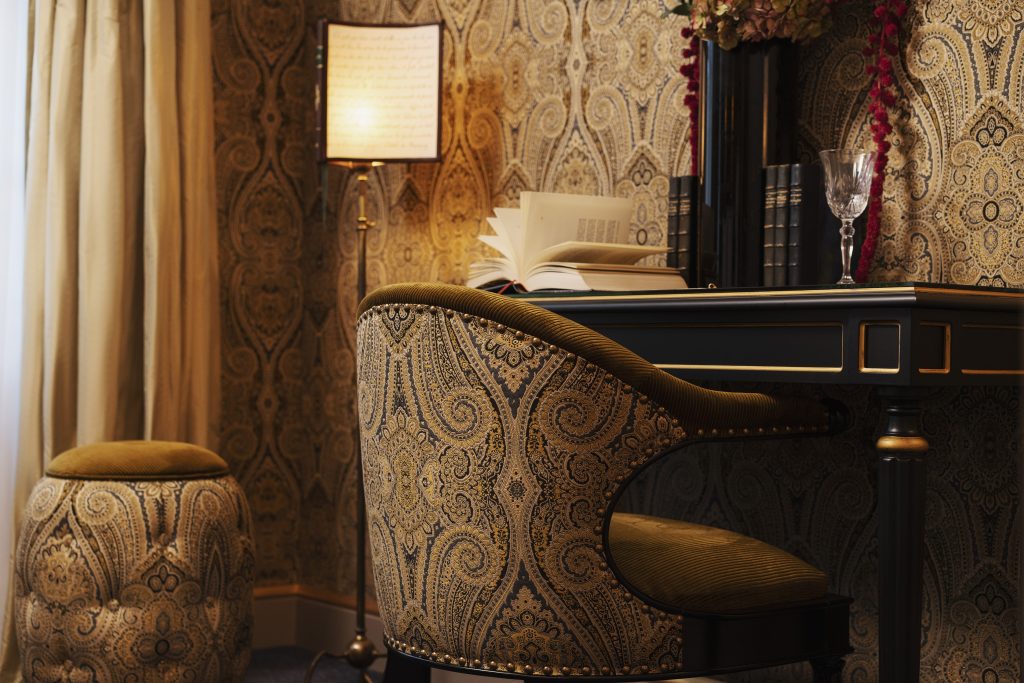

With infinite gratitude and building on the success of Maison Souquet, voted “Most romantic hotel in the world,” the Maisons Particulières Collection is unveiling its new location, Maison Proust.
Maison Proust restores the splendour of Parisian salons in the Belle Epoque, in keeping with his masterpiece, Remembrance of Things Past.
Jacques Garcia
During the Belle Epoque, kings and queens, princes and princesses, the aristocracy of Faubourg Saint-Germain, and every gilded name from the world of art and politics attended the hushed salons, lively cafés, theatres, and Garnier Opera House that illustrated the thriving brilliance of the golden era in which Paris reigned supreme over beauty and culture.
Princess Mathilde, Colette, the Countess Greffulhe, Robert de Montesquiou, Sarah Bernhardt, Anna de Noailles, Jean Cocteau, Léontine de Caillavet, Geneviève Straus, the Countess Potocka, and so many other well-known figures of Marcel Proust’s entourage who inspired characters in Remembrance of Things Past await in the intimacy of an exceptional setting made up of period paintings, antique furniture, works of art, and exclusive tapestries, brought together to give you a dizzying, authentic, and sincere immersion in the golden era of the Belle Epoque.

Marcel Proust
Both a literary genius and myth, Marcel Proust (1871–1922) remains one of the most famous writers in the world, thanks to his monumental masterpiece, Remembrance of Things Past.
Made up of seven volumes published between 1913 and 1927, this literary monument remains one of the most commented works of our time. Through essays, articles, publications, and colloquiums, Proust amateurs and academics examine, analyse, pore over, and endlessly comment on this “cathedral of words” on memory and oblivion, love and death, beauty, and time which passes, is lost, and found again. Themes from a universal book which will always raise questions, move and challenge us about our most intimate emotions.


The Marais is a historic neighbourhood famous for its many private townhouses built in the 17th century, the still glorious residences of Parisian nobility and upper class. Some have been turned into museums or cultural institutions, such as the Picasso Museum and Musée Carnavalet, the Hôtel de Sully and Hôtel de Guénégaud, etc.
Over time, the Marais has become the capital’s most lively, trendy neighbourhood. It is particularly renowned for the Marché des Enfants Rouges, the city’s oldest covered market, its cutting-edge fashion boutiques, retro clothing and antique dealers, and art galleries. The high place of Parisian contemporary life, the Marais’s cobblestoned streets are also scattered with countless gourmet places serving a wide range of dishes. Various communities have lived here, living in harmony and constantly filling this inspiring neighbourhood with a festive spirit.
Collection Maisons Particulières | Maison Souquet |
Maison Proust, 26 rue de Picardie – 75003 Paris | +33 1 86 54 55 55 | contact@maison-proust.com
| Mentions Legales |
Collection Maisons Particulières | Maison Souquet | Maison Proust, 26 rue de Picardie – 75003 Paris | +33 1 86 54 55 55 | contact@maison-proust.com
Mentions Legales